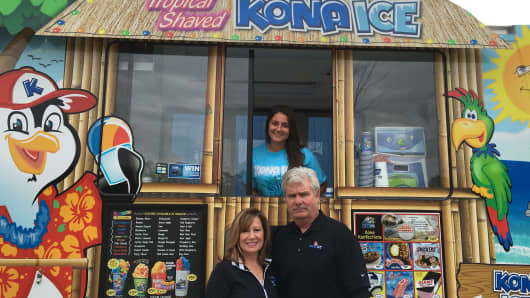Pam and Gary Sample had been running a mobile catering business for 15 years when, in 2009, they met Tony Lamb, president of Kona Ice, a national franchise featuring flavored shaved-ice dessert trucks.
The Samples knew this was a natural fit for them because of their past career in the mobile catering business, and the following year, they purchased their first Kona Entertainment Vehicle — or KEV, as they're known. Schools, community event organizers, and festivals throughout southern North Carolina book the trucks that sell a variety of shaved flavored ices. In 2011 the couple added another vehicle and, more recently, a smaller Kona Ice kiosk that enables them to service events that don't have room for the big Kona trucks to park.




























































